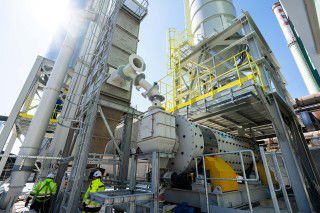Following this week's 'Choose France summit', Heidelberg Materials has announced the investment of EUR65m to accelerate the decarbonisation of its Bussac-Forêt cement plant in the west of France. The plant will be expanded to include a facility to produce calcined clay, which can replace parts of the CO₂-intensive clinker in the cement. This will allow the launch of a new range of low-carbon calcined clay cements containing less clinker.
This latest investment is in addition to the EUR46m already committed by Heidelberg Materials to decarbonise the Bussac-Forêt cement plant by increasing the alternative fuel rate from 30 to 80 per cent. The project is financially supported by the Ecological Transition Agency as part of the France Recovery programme, and benefits from support from the Nouvelle-Aquitaine region. The investment will allow the launch of a new range of low-carbon calcined clay cements containing less clinker.
“Our most recent investment in innovative technologies in France demonstrates Heidelberg Materials’ strong commitment to decarbonise our products. The launch of the transformative project in Bussac-Forêt will be supported by a favourable administrative and regulatory environment”, said Dr Dominik von Achten, chairman of the Managing Board: “The project will reduce the site's CO₂ emissions by up to 20 per cent and thus have a significant positive impact on Heidelberg Materials’ carbon footprint in France.”
Dr Nicola Kimm, chief sustainability officer and member of the Managing Board, added: “In Bussac-Forêt, we are investing in a technology with great potential. It will allow us to significantly expand the range of low-carbon products. Using calcined clay as clinker substitute is an important measure to reduce the carbon footprint of cement and concrete. In principle, a CO₂ reduction of up to 40 per cent is possible when substituting cement clinker with calcined clay.”
The company is currently piloting calcined clay technology in Ghana, where the world's largest flash calciner is currently being built with a capacity of more than 400,000tpa. In principle, a CO₂ reduction of up to 40 per cent is possible when substituting cement clinker with calcined clay.
